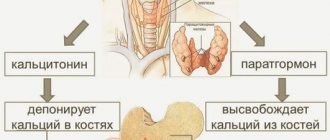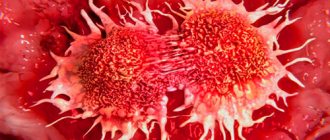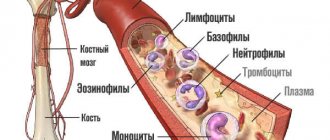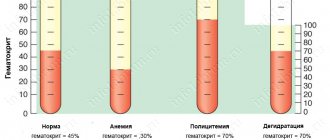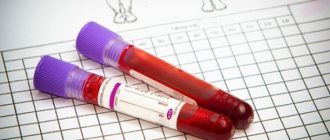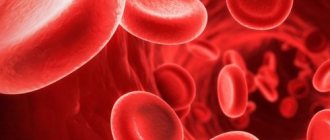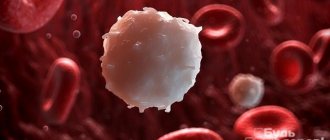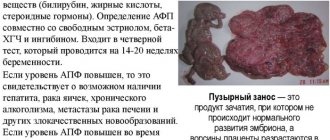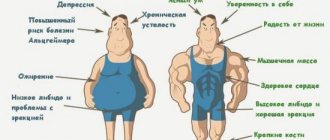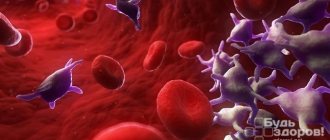Hypogonadism
Blackheads (acne)
Cervical cancer
22173 16 October
IMPORTANT!
The information in this section cannot be used for self-diagnosis and self-treatment.
In case of pain or other exacerbation of the disease, diagnostic tests should be prescribed only by the attending physician. To make a diagnosis and properly prescribe treatment, you should contact your doctor. We remind you that independent interpretation of the results is unacceptable; the information below is for reference only.
Testosterone: indications for use, rules for preparing for the test, interpretation of results and normal indicators.
Main functions of the hormone
The main functions of testosterone are:
- normalization of the reproductive system;
- normal male-type puberty;
- development of secondary sexual characteristics;
- normalization of metabolism;
- proper muscle building;
- proper growth of adipose tissue;
- development of the skeletal system;
- sperm maturation;
- vital activity of sperm (their mobility, vitality);
- responsible for the protective functions of the body.
If the level of the hormone testosterone in the blood is not at the proper level, then all the main important functions of the male body can be significantly impaired. That is why men should not ignore a blood test for testosterone.
What kind of hormone is this
Testosterone is the main male sex hormone, which belongs to the group of androgens. Produced in the body by the testes and adrenal glands. It is also produced by women - in small quantities by the ovaries and the same adrenal cortex. Testosterone is more than just a name. In modern society, it implies strength, courage, power. This hormone is often called the hormone of winners or “kings”.
Testosterone is the main male sex hormone
Without testosterone, normal sexual development of a representative of the stronger sex does not occur.
The level of its content in the blood directly affects the expression of sexual characteristics and the functioning of the organs of the reproductive system.
Normal testosterone levels in men are a guarantee:
- proper development, growth and functioning of the reproductive system;
- high-quality stimulation of libido, thanks to which a man fully feels that he belongs to the stronger sex;
- controlling spermatogenesis;
- the formation of classic male characteristics, both physical and psychological - for example, body and facial hair, deep voice, habits, character traits, even gait.
The norm of the testosterone hormone in the blood of men, how to calculate
The level of testosterone in the blood depends directly on many factors, such as lifestyle, nutrition, physical activity of a man and much more.
May be interesting: Hypogonadism in men: classification, symptoms and how to treat this disease
Testosterone cannot be measured over a lifetime with a single number. Thus, the general indicator varies from 12 to 33 nmol/l. In this case, the androgen is divided into several fractions, each of them is responsible for certain functions. For example:
- testosterone bound to albumin occupies 40% of the total;
- free, up to 3% of the total (on average 3.5-12 nmol/l), this is the main one for the male body, the other 57% is associated with globulin and is considered inactive.
The doctor determines which blood test to take - for free testosterone or total testosterone.
Why do androgen levels fluctuate?
It is known that the concentration of testosterone in the blood changes significantly even throughout the day. The maximum level of the hormone is observed in the morning. It gradually drops during the day, reaching its minimum value around 7-9 pm. This is why a testosterone test is usually prescribed in the morning, as this will help achieve high accuracy of the research.
In addition, it has been proven that testosterone synthesis is characterized by a circadian rhythm. That is, the intensity of production of this hormone at one time or another depends on the time of year. Short-term fluctuations occur quite often, although men are not aware of it. The cause of unplanned jumps can be such provoking factors as:
- a sharp change in psychological state - stress, fear, anger, aggression, etc.;
- eating food that has a minor effect on hormonal levels;
- physical exercise. For example, after an intense workout, testosterone levels in the blood increase. However, if you overwork, the situation will be the opposite, since the body simply will not have time to recover.
Stress and poor nutrition reduce testosterone levels
The level of total testosterone in men depends on many factors. Their presence can disrupt the normal concentration of biologically active substances for a long period of time. In the most advanced cases, the help of specialists will be required. The reasons that negatively affect testosterone levels in the long term are very simple and understandable:
- age category - as a man gets older, the level of production of the main hormone begins to decrease. This is a natural process that cannot be prevented. This is usually observed after thirty years. Testosterone production decreases by about 1 percent per year;
- negative psychological state – frequent stress, depression, unnecessary and unnecessary experiences. All this negatively affects hormonal levels;
- health problems - obesity, chronic diseases, damage to organs that produce hormones (not only testosterone), decreased protective reactions of the immune system, etc.;
- unhealthy lifestyle – unbalanced and poor-quality nutrition, alcohol abuse, smoking, drug use, insufficient physical activity, inactivity. It is important to remember that a healthy lifestyle helps normalize hormonal balance:
- taking drugs classified as anabolic steroids. The bottom line is that the body gets used to the fact that it receives hormones for nothing, and therefore stops producing them in the proper quantities on its own;
- genetic predisposition - the hereditary factor also should not be discounted, although this situation is quite rare.
High testosterone levels
Symptoms
How can you determine visually and behaviorally your testosterone level:
- excessively high sexual desire;
- there is a tendency towards violence;
- rapid excitability;
- excessive temper, nervousness;
- a large amount of body hair;
- suicidal tendencies;
- drug addiction, alcoholism;
- developed muscle mass;
- low timbre of voice;
- excessive amount of body hair.
A typical picture of the appearance of a man who has high testosterone levels. The man is sexually active.
High levels of testosterone in the blood in adolescents
During puberty, high rates lead to rapid formation of bone tissue. Puberty begins earlier. At this moment, the penis enlarges, and the scrotum noticeably lags behind in development.
Causes
The reasons that led or contribute to an increase in testosterone levels in the blood in men include the following:
- heavy physical activity;
- congenital pathology of the adrenal cortex;
- genetic predisposition;
- neoplasms in the prostate gland;
- malignant neoplasms in the testicles;
- pituitary adenoma;
- misuse of steroids.
The secretion of sex hormone occurs in the testicles of a man. A command comes from the brain to produce hormones. The hypothalamus and pituitary gland are responsible for commands. Thus, any disturbance in testosterone levels directly depends on the work of the pituitary gland and hypothalamus.
May be interesting: Details about endemic thyroid goiter
High and low testosterone levels
Increased testosterone in men
Elevated testosterone does not in all cases indicate illness. This happens, for example, during early puberty. Other reasons include:
- Itsenko–Cushing syndrome
- adrenogenital syndrome
- consumption of anabolic steroids to increase muscle mass
- testicular tumors
- prostate cancer
Symptoms of increased TT
Boys in puberty may have the following symptoms of too high testosterone levels:
- rapid growth (“in leaps”)
- bone growth too fast
- penis enlargement without scrotum enlargement
- early puberty
- early voice failure
Although growth is quite fast, such boys do not grow tall. If a child has adrenogenital syndrome, from a very young age the child looks like an adult. He has muscle mass, an erection, and body hair as a secondary sexual characteristic.
In men, high TT in the blood leads to character changes. They become more impulsive, aggressive, and their mood can change over trifles. The following signs are also typical for them:
- engaging in sexual relations with different partners
- looseness in relationships with girls and women
- long lasting erection
- increased sexual desire
- strength and endurance
- lean body with low fat levels
- severe hair growth on the arms, legs, abdomen and chest
- baldness due to hair loss on the head
Low testosterone levels
Symptoms
How can you determine visually and behaviorally low testosterone levels in a man:
- poor development of muscle mass;
- instead of muscle mass, adipose tissue predominates;
- mammary glands enlarge;
- increased feeling of touchiness, tearfulness;
- noticeably small volume of seminal fluid;
- insomnia, shortness of breath, sweating;
- fragile bones.
At the age of 40, the hormone testosterone may decline in most men, but even before the age of 40, the production of the hormone may fail, leading to deficiency. Lack of the hormone can provoke depression and a noticeable loss of sexual function. At the same time, the man gains weight (unreasonably), becomes indifferent, and his immunity decreases. In addition, the physique begins to resemble a female figure.
Causes
What are the reasons for decreased testosterone levels:
- physiological aging of the body;
- abuse of bad habits;
- constant stress;
- constant use of painkillers (or antidepressants);
- lack of vitamins;
- lack of walks in the fresh air.
Of course, there are a lot of factors, we have listed the main ones.
Level is normal
Depending on age, the level of general
, and therefore
free
testosterone varies.
In children from one year old it is 0.42-0.72 pg
/
ml
, at 7 years of age it decreases slightly to 0.1 - 1.12. Until children reach 13 years of age it increases to 2.37
nmol
/
liter
.
At the age of 18-55 years, free testosterone is normal in men
consists of 5.5 to 42
pg
/
ml
.
In people over 50 years of age, it varies between 6.68-25.7 pg
/
ml
.
If the testosterone level is excessively low
(from 2.0 – 4.5 units), then it is impossible to have a full sex life.
Processes ensured by normal testosterone levels in men:
- Attraction to members of the opposite sex;
- Potency possibilities are regulated;
- Sperm are produced in the required number;
- Stimulation of muscle growth begins;
- Helps burn subcutaneous fat;
- A protein substance is produced and the absorption of the glucose-containing element is stimulated;
- Supports normal tissue density in bone;
- Increased sensitivity in the external genital system.
There is a direct relationship between testosterone levels and sexual activity in men. The norm increases after sexual intercourse, and if a man abstains from relationships for a long time, then the indicator decreases. With increased testosterone in a man’s body, his sexual activity increases.
Why is a decrease in sex hormone dangerous?
Initially, normal testosterone levels directly protect a man from premature aging. During hormonal imbalance, systems in the body such as the endocrine, cardiovascular system, and brain often suffer. With low testosterone in a man, especially over the age of 40, the following appear: blood sugar, hypertension, obesity, and the risk of metabolic syndrome.
Might be interesting:
|
Age characteristics, testosterone standards by age
When deciphering the results of a blood test for the hormone testosterone, doctors must take into account the patient’s age:
- in adolescents the amount of testosterone is highest;
- in men aged 30 years, the amount of testosterone is average;
- in men over 40 years of age, the value of the inactive hormone decreases by 1-2% annually;
- in men over 50 years of age, the value of testosterone in the blood decreases to the lower limit;
- in men over 60 years of age, the value of the testosterone hormone is 1/4 of the lower limit.
Testosterone in men by age
Table: normal testosterone levels in the blood of men by age
In what cases is it necessary to get tested?
Total testosterone is a sex hormone involved in the functioning of the nervous, reproductive and circulatory systems. The substance is synthesized in the testes and adrenal cortex from cholesterol. About 5-10 g are produced per day. The serum level of the hormone is regulated by the pituitary gland and hypothalamus.
There are 2 types of hormonal substances circulating in the vessels:
- Associated with proteins. 60% form a complex with globulins and albumins and therefore remain inactive.
- Free testosterone (FT). Can be absorbed by cells and have an androgenic effect on them. No more than 5% of the hormone circulates in an unbound state. This amount is sufficient for normal functioning of the genital organs.
The level of the hormone is determined when symptoms of disruption of the endocrine system and reproductive organs appear. An analysis to determine testosterone concentration is prescribed for:
- obesity;
- Klinefelter's syndrome;
- acne;
- chronic form of inflammation of the prostate gland;
- osteoporosis;
- malignant neoplasms of the adrenal glands;
- hypogonadism;
- decreased sexual arousal.
The level of free testosterone in men is detected in cases of infertility or erectile dysfunction.
How to check your male hormone levels
The content of a hormonal compound in the blood of men is determined by laboratory testing. The most accurate results are provided by ECLIA, or electrochemiluminescent immunoassay of venous blood.
Before obtaining reliable examination results, it is necessary to properly prepare:
- stop eating food 6-8 hours before the procedure;
- 2 days in advance, if possible, stop taking hormonal, anti-inflammatory and antibacterial medications;
- Stop smoking and drinking alcohol in 1 day.
Blood sampling is carried out on an empty stomach until 10:00.
Factors affecting testosterone levels
- Stress and irritability in a constant form, since these conditions produce a hormone that helps suppress testosterone.
- Lack of any physical activity.
- Poor nutrition: many foods have a rather negative effect on the male body. These include: smoked meats, baked goods, sweets. All these foods contribute to the formation of fat, and fat is the main enemy of testosterone. A man's diet should include: vegetables, fruits, meat, protein, juice, nuts, dairy products.
- Bad habits.
- Chronic infectious diseases suffered in childhood.
- Weak immune system.
- Arterial hypertension.
- Diseases of the cardiovascular system.
- Chronic use of steroids (athletes).
- Chronic diseases: diabetes, endocrine diseases.
What is free testosterone?
This is the name of one of the varieties of male hormonal substances that are not combined with a protein element. It is this type of testosterone that has the greatest impact on the human system, so it is necessary to maintain the hormone in a fairly normal state in order to be healthy and sexually active.
It is this testosterone substance that influences the formation of sexual characteristics.
If the norm falls lower than necessary, then men suffer from impotence, metabolism, and an imbalance in the work process in the nervous and cardiovascular systems. Fluctuations in readings occur several times a day. The level of testosterone hormonal substance is highest; it can be determined in the morning, which most often manifests itself in the form of erections.
The lowest level can be determined in the evening. Changes in testosterone are less noticeable due to age categories, when erections disappear in the morning.
When is it necessary to get tested?
If a man notices a malfunction in the body, then this is a reason to take a blood test, such signs include:
- noticeable shrinkage of the testicles;
- frequent urge to urinate;
- decreased attraction to women;
- noticeable problems with ejaculation or erection;
- noticeable increase in adipose tissue according to the female type;
- rapid fatigue during physical activity;
- noticeable hair loss on the face, chest, arms;
- increase in the volume of the mammary glands;
- heart failure (arrhythmia);
- acne in an adult;
- low hemoglobin levels in the blood;
- deterioration of the skin condition;
- loss of attention, concentration, memory;
- insomnia;
- sudden change of mood;
- constant feeling of fatigue;
- absence of the desired pregnancy in a healthy partner.
Young men are prescribed a blood test for testosterone if puberty does not occur, it is very late. Also in case of underdevelopment of the genital organs.
How to prepare for the test
For an accurate result, it is necessary to take the analysis correctly, for this you need:
- The day before donating blood, it is necessary to avoid intimacy and physical activity, since in these conditions the synthesis of androgen significantly increases, which can distort the result.
- Avoid drinking alcoholic beverages 2-4 days before the test.
- Stop smoking at least 10 hours before donating blood.
- If you use medications, you must inform your doctor about this.
- A blood test must be taken on an empty stomach.
Call the medical institution where you plan to take the test in order to find out the hours and days when you can take this blood test. Find out what you need to take with you.
If you follow all the preparation rules before taking a blood test for the hormone testosterone, then the accuracy of the results obtained is high.
Testosterone testing
To determine whether everything is in order with TT in the body, you need to donate blood from a vein to determine the testosterone in it. If deviations from the norm are detected, the attending physician may prescribe further tests. You need to understand what is the reason for this condition. The causes can be both natural and pathological. The following studies may be needed:
- thyroid hormones
- prolactin and female sex hormones
- STG
- ACTH
- blood test for sugar and cholesterol
- Magnetic resonance imaging of the adrenal glands, pituitary gland and brain
- ultrasound examination of internal organs
- Ultrasound of the ovaries, uterus, mammary glands
- ultrasound diagnostics of testicles and prostate gland, etc.
In order to timely detect adrenogenital syndrome in a newly born child, blood is taken from his heel in the first days. Remember that the test in many cases gives false positive results (that is, it shows the presence of a pathology that the baby actually does not have).
How to get tested for TT
As already noted, to conduct the study, your blood will be taken from a vein, not from your finger. In most laboratories, the result will be given to you (or sent) within 24 hours. The test must be taken on an empty stomach. 2-3 days before donating blood, stop taking hormonal medications (you should consult your doctor on this issue).
12 hours before, or better yet 24 hours, eliminate smoking cigarettes and drinking alcohol, do not play sports and do not engage in any serious physical activity for 24 hours. Women need a testosterone test on the sixth or seventh day of their menstrual cycle to get reliable results.
Deviations of the analysis for free testosterone from the norm
The test for free testosterone should be normal; any deviation may indicate one or another pathology.
At high rates the following may occur:
- fairly early puberty;
- neoplasms in the area of the adrenal cortex;
- Itsenko-Cushing's disease;
- adrenal hyperplasia syndrome;
- decreased globulin synthesis.
With a lack of hormone it is possible:
- obesity;
- prostatitis becomes chronic;
- uremia;
- liver failure;
- absence (slowdown) of puberty;
- Kallmann syndrome;
- renal failure.
What to do if testosterone levels are low
If tests show a very slight decrease in the hormone, then you can try to restore the balance at home; doctors recommend:
- regular sex life with one partner;
- constant consumption of protein;
- rational distribution of physical activity and labor;
- complete rest;
- rejection of bad habits;
- moderate exercise.
To this, the doctor may add the use of products containing testosterone: patches, injections, gels, tablets.
